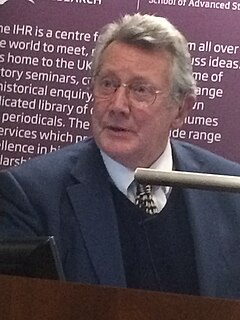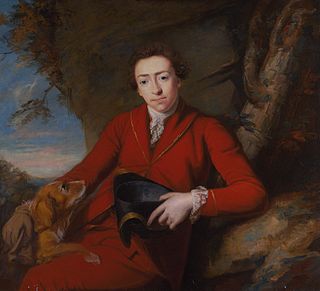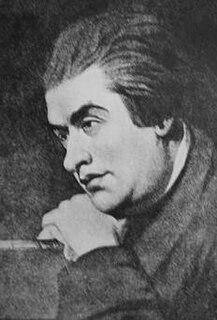
Samuel Johnson, often called Dr Johnson, was an English writer who made lasting contributions as a poet, playwright, essayist, moralist, critic, biographer, editor and lexicographer. He was a devout Anglican, and a committed Tory. The Oxford Dictionary of National Biography calls him "arguably the most distinguished man of letters in English history". James Boswell's Life of Samuel Johnson was selected by Walter Jackson Bate as "the most famous single work of biographical art in the whole of literature".

A Dictionary of the English Language, sometimes published as Johnson's Dictionary, was published on 15 April 1755 and written by Samuel Johnson. It is among the most influential dictionaries in the history of the English language.

David Garrick was an English actor, playwright, theatre manager and producer who influenced nearly all aspects of European theatrical practice throughout the 18th century, and was a pupil and friend of Samuel Johnson. He appeared in a number of amateur theatricals, and with his appearance in the title role of Shakespeare's Richard III, audiences and managers began to take notice.

Hester Lynch Thrale Piozzi, a Welsh-born diarist, author and patron of the arts, is an important source on Samuel Johnson and 18th-century English life. She belonged to the prominent Salusbury family, Anglo-Welsh landowners, and married first a wealthy brewer, Henry Thrale, then a music teacher, Gabriel Mario Piozzi. Her Anecdotes of the Late Samuel Johnson (1786) and her diary Thraliana, published posthumously in 1942, are the main works for which she is remembered. She also wrote a popular history book and a dictionary. She has been seen as a protofeminist.

The Cock Lane ghost was a purported haunting that attracted mass public attention in 1762. The location was a lodging in Cock Lane, a short road adjacent to London's Smithfield market and a few minutes' walk from St Paul's Cathedral. The event centred on three people: William Kent, a usurer from Norfolk; Richard Parsons, a parish clerk; and Parsons' daughter Elizabeth.

Beefsteak Club is the name or nickname of several 18th- and 19th-century male dining clubs in Britain and Australia, that celebrated the beefsteak as a symbol of patriotic and often Whig concepts of liberty and prosperity.
Christopher Hibbert MC was an English author, historian and biographer. He has been called "a pearl of biographers" and "probably the most widely-read popular historian of our time and undoubtedly one of the most prolific". Hibbert was a Fellow of the Royal Society of Literature and the author of many books, including The Story of England, Disraeli, Edward VII, George IV, The Rise and Fall of the House of Medici, and Cavaliers and Roundheads.

Ivy League Records is a record label based in Sydney, Australia.

Thomas Davies was a Scottish bookseller and author. He studied at the University of Edinburgh and was for some years on the stage; but having been ridiculed by Churchill in The Rosciad he gave up acting and opened a bookshop in Covent Garden. It was here that in 1763 he introduced Boswell to Dr. Johnson, who was his close friend and to whom he dedicated his edition of the works of Massinger. He wrote a successful Life of Garrick (1780), which passed through four editions, and Dramatic Miscellanies.

The Club or Literary Club is a London dining club founded in February 1764 by the artist Joshua Reynolds and essayist Samuel Johnson, with Edmund Burke, the Anglo-Irish philosopher-politician.

Vic Gatrell is a British historian. He is a Life Fellow of Gonville and Caius College, Cambridge.

Sir John Lade, 2nd Baronet was a prominent member of Regency society, notable as an owner and breeder of racehorses, as an accomplished driver, associated with Samuel Johnson's circle, and one of George IV's closest friends. While that monarch was still Prince Regent, Lade attracted high society scorn from the extent of his debts and his choice of marriage to low-born beauty Letitia, who was generally supposed to have been the mistress of the executed highwayman John Rann and the Regent's next-youngest brother, the Duke of York.
The Life of Samuel Johnson or Life of Samuel Johnson, LL. D. was written by John Hawkins in 1787. It was the first full biography of Samuel Johnson—with Thomas Tyers's A Biographical Sketch of Dr Samuel Johnson being the first short postmortem biography. Hawkins was a friend of Johnson, but many in Johnson's circle did not like him. After Johnson's death, Hawkins was approached to produce a biography on Johnson and an edition of his works. His biography described Johnson's life, including previously unknown details about his writing career, but it was plagued by digressions into unrelated topics. Hawkins's Life of Samuel Johnson came under swift attack from critics, from friends of Johnson, and from his literary rival, James Boswell immediately after its publication. Many of the critics attacked Hawkins for his lack of strict focus on Johnson's life or for his unfavourable depiction of Johnson in various circumstances.
The health of Samuel Johnson has been a focus of the biographical and critical analysis of his life. His medical history was well documented by Johnson and his friends, and those writings have allowed later critics and doctors to infer diagnoses of conditions that were unknown in Johnson's day.

Samuel Johnson was an English author born in Lichfield, Staffordshire. He was a sickly infant who early on began to exhibit the tics that would influence how people viewed him in his later years. From childhood he displayed great intelligence and an eagerness for learning, but his early years were dominated by his family's financial strain and his efforts to establish himself as a school teacher.
Winifred Carter was an English author and playwright, who was particularly active from the 1920s–40s.
Three Hours After Marriage was a restoration comedy, written in 1717 as a collaboration between John Gay, Alexander Pope and John Arbuthnot, though Gay was the principal author. The play is best described as a satirical farce, and among its satirical targets was Richard Blackmore.

Samuel Dyer (1725–1772) was an English translator.
Edmond Barker (1721–1780?) was an English physician.












